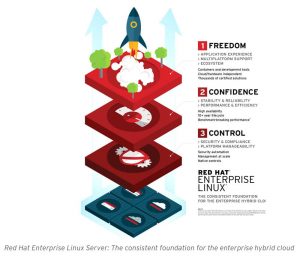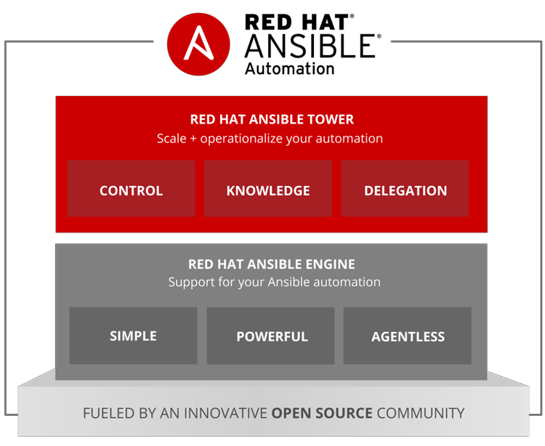Red Hat Enterprise Linux 7.5 Foundation for Hybrid Cloud Environments
Provides consistency for hybrid IT environments, delivers enhanced security at scale, Windows interoperability and storage cost reductions.
This is a Press Release edited by StorageNewsletter.com on April 16, 2018 at 2:44 pmRed Hat, Inc. announced the availability of RH Enterprise Linux 7.5, the latest version of the enterprise Linux platform.
Click to enlarge
Serving as a consistent foundation for hybrid cloud environments, Enterprise Linux 7.5 provides enhanced security and compliance controls, tools to reduce storage costs, and improved usability, as well as further integration with Windows infrastructure both on-premise and in Microsoft Azure.
As enterprise IT footprints expand to encompass a spectrum of environments, from bare metal to private and public clouds, organizations are frequently seeking to pair existing infrastructure and application investments with emerging digital technologies. RH Enterprise Linux 7.5 can help enterprises address this challenge by reducing infrastructure complexity and associated costs while easing the management of hybrid IT environments.
Enhanced hybrid cloud security and compliance
Hybrid IT environments provide new capabilities for enterprises, but can also present unique security challenges, as IT teams must now tackle security challenges across multiple deployment footprints. To better meet the varied security needs of hybrid computing, RH Enterprise Linux 7.5 provides enhanced software security controls to mitigate risk while also complementing, rather than hindering, IT operations.
A major component of these controls is security automation through the integration of OpenSCAP with RH Ansible Automation. This is designed to enable the creation of Ansible Playbooks directly from OpenSCAP scans which can then be used to implement remediations more rapidly and consistently across a hybrid IT environment. Sensitive data can also now be better secured across varied environments with enhancements to Network-Bound Disk Encryption that support automatic decryption of data volumes.
Improved storage performance and efficiency
As enterprises seek to extend existing IT investments to both support hybrid cloud deployments and reduce overhead costs, storage optimization frequently becomes an important piece of the strategy. RH Enterprise Linux 7.5 can help with the inclusion of virtual data optimizer (VDO), designed to reduce storage costs in the cloud and on-premise by up to 83% according to the company’s internal research. VDO reduces data redundancy and improves effective storage capacity through de-duplication and compression of data before it lands on a disk.
Simplified management
RH Enterprise Linux 7.5 can help reduce the overall learning curve for new Linux systems administrators, troubleshooters, and developers by making complex tasks, like systems management, easier through enhancements to the cockpit administrator console. Provided as a simplified web interface, these enhancements are designed to eliminate many of the complexities involved with managing Linux-based systems, including network and storage set-ups.
Additionally, new functionality and integration with Windows-based infrastructure is offered in RH Enterprise Linux 7, including improved management and communication with Windows Server implementations, more secure data transfers with Azure, and performance improvements for complex Active Directory architectures. Overall, this can help to provide a smoother transition for organizations seeking to bridge the scalability and flexibility of RH Enterprise Linux 7.5 implementations with existing Windows-based IT investments.
Production-ready Linux containers
As containerized applications and container-based infrastructure frequently form a foundational component for many digital transformation strategies, RH Enterprise Linux 7.5 emphasizes the firm’s leadership in making container-based technologies production-ready. Container security has been enhanced, adding proactive security and compliance configuration at build along with finer-grained security and host layer access controls.
RH Enterprise Linux 7.5 also adds support for Buildah, an open source utility designed to help developers create and modify Linux container images without a full container run time or daemon running in the background. This enables IT teams to build and deploy containerized applications more quickly without needing to run a full container engine, reducing the attack surface and removing the need to run a container engine on a system not intended to do so in production.
Availability across multiple architectures
To further support customer choice in computing architecture, RH Enterprise Linux 7.5 is simultaneously available across all supported architectures, including x86, IBM Power, IBM z Systems, and 64-bit Arm. This release also brings support for single-host KVM virtualization and Open Container Initiative (OCI)-formatted runtime environment and base image to IBM z Systems.
Red Hat Enterprise Linux 7.5 is available in the company’s customer portal to all customers with an active RH Enterprise Linux subscription.
Denise Dumas, VP, platform engineering, Red Hat, said: “The future of enterprise IT doesn’t exist solely in the datacenter or in the public cloud, but rather as a fusion of environments spread across IT’s four footprints: physical, virtual, private cloud, and public cloud. Red Hat Enterprise Linux serves as a scalable, flexible, and robust bridge across these footprints, and the latest version of the world’s leading enterprise Linux platform provides even more capabilities, from security at scale to increased storage efficiency, to drive hybrid cloud forward in the enterprise.“
















 Subscribe to our free daily newsletter
Subscribe to our free daily newsletter

